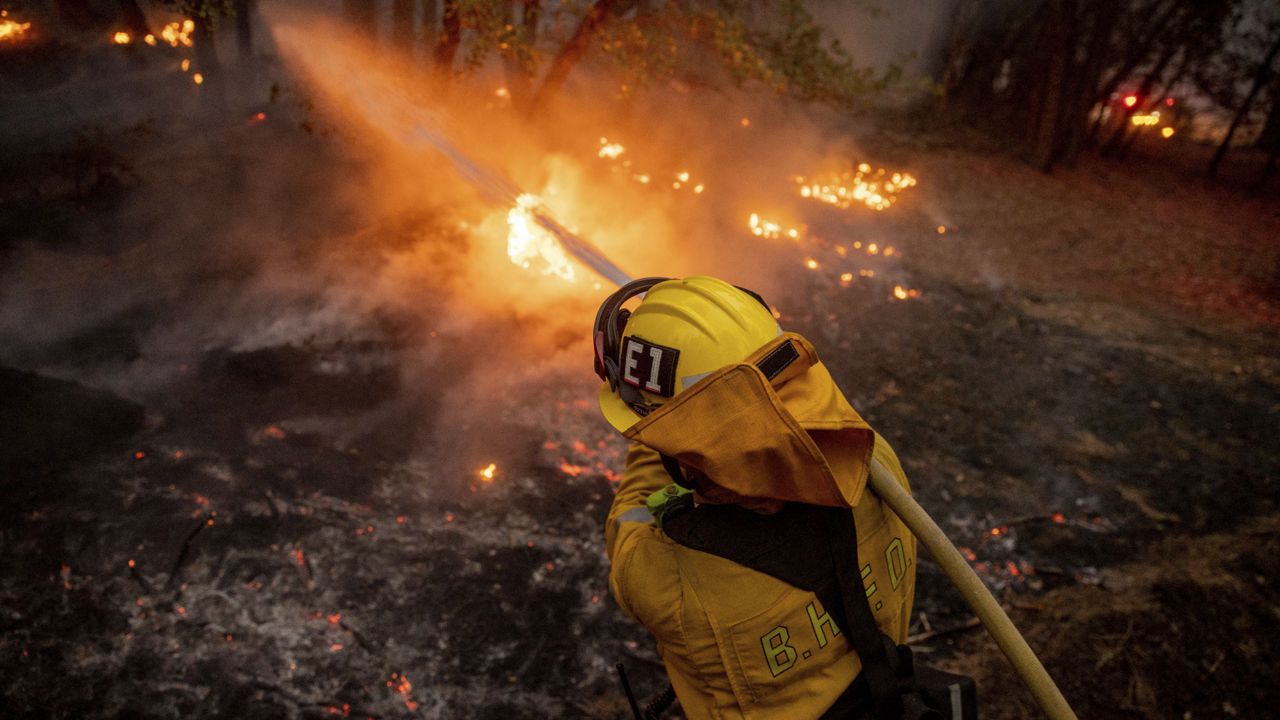MATHER, Calif. (AP) — More than 13,500 firefighters were working Monday to contain a dozen large California wildfires that have destroyed hundreds of homes and forced thousands of people to flee to safety.
After an extensive review of fire damage, Gov. Gavin Newsom requested a presidential major disaster declaration for eight counties, Mark Ghilarducci, director of the California Office of Emergency Services, told a briefing near Sacramento.
If approved, the declaration would provide a wide range of assistance including housing, food aid, unemployment and governmental emergency costs, Ghilarducci said.
Nearly 43,000 Californians were under evacuation orders and more than 500 households were in shelters, he said.
New concerns were developing at the explosive Caldor Fire southwest of Lake Tahoe, the famed alpine lake straddling the California-Nevada state line and surrounded by peaks of the Sierra Nevada and resort communities.
The Caldor Fire has become the nation's number one priority for firefighting resources, said Chief Thom Porter, director of the California Department of Forestry and Fire Protection.
“It is knocking on the door to the Lake Tahoe basin,” Porter said. “We have all efforts in place to keep it out of the basin but we do need to also be aware that is a possibility based on the way the fires have been burning.”
Porter said he personally did not believe the fire would get into the basin but that he could be proved wrong.
The Caldor Fire has incinerated more than 166 square miles (430 square kilometers) of El Dorado National Forest and continuing assessments showed 447 buildings destroyed. More than 17,000 structures were still under threat.
Two police officers from the Sacramento County city of Galt were in critical condition after a head-on traffic collision while they were headed to the Caldor Fire under a law enforcement mutual aid deployment, Ghilarducci said.
To the north, containment increased to 40% at the Dixie Fire, which has burned more than 1,130 square miles (2,926 square kilometers) in the northern Sierra Nevada and southern Cascades. Ongoing assessments showed 1,259 buildings destroyed, including 678 single-family homes, Cal Fire said. Nearly 13,000 structures remained threatened.
In Nevada, public schools in the Reno and Sparks area and parts of Lake Tahoe were closed Monday due to wildfire smoke, affecting 67,000 students.
In Northern California, where most of the fires are burning, there were no red flag warnings for critical conditions but the seven-day outlook called for moderate fire danger. In Southern California, meanwhile, moist ocean air has been keeping skies cloudy and temperatures cooler than normal well into each day.
Porter said that meant there was low potential for large new fires in Southern California, allowing firefighting resources to be surged from south to north.
While Southern California has so far escaped large-scale wildfires this year, Los Angeles officials on Monday urged residents to be aware of what’s going on in the north because the region’s high fire season is typically late in the year when dry, gusty Santa Ana winds blast out of the interior and flow toward the coast.
“That awareness is going to help us when it happens here in Southern California,” Los Angeles Fire Chief Ralph Terrazas said during a briefing to display the city’s fleet of firefighting helicopters at Van Nuys Airport.
The mix of spring growth dried out by summer heat and high winds creates “a dangerous condition that could lead to large, fast-moving brush fires,” he said.
California’s fires were among more than 90 large, active fires in the U.S. on Monday, according to the National Interagency Fire Center in Boise, Idaho.
Climate change has made the West warmer and drier in the past 30 years and will continue to make the weather more extreme and wildfires more destructive, according to scientists.



